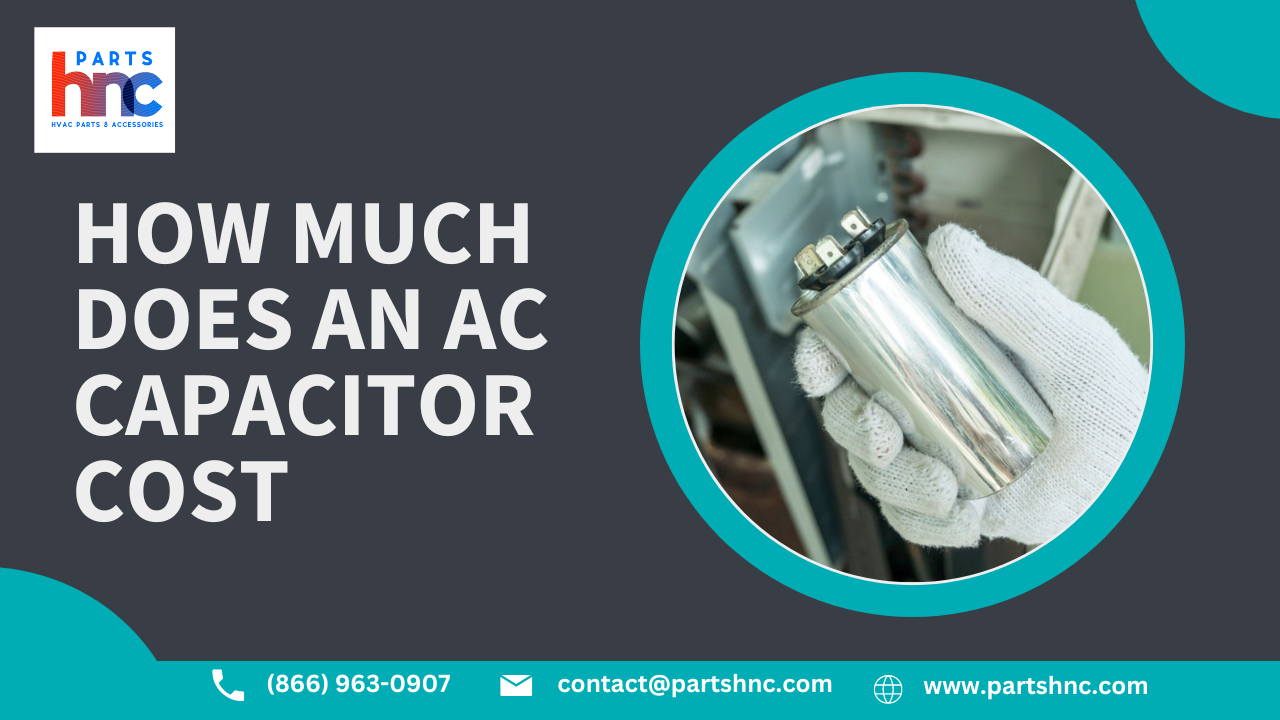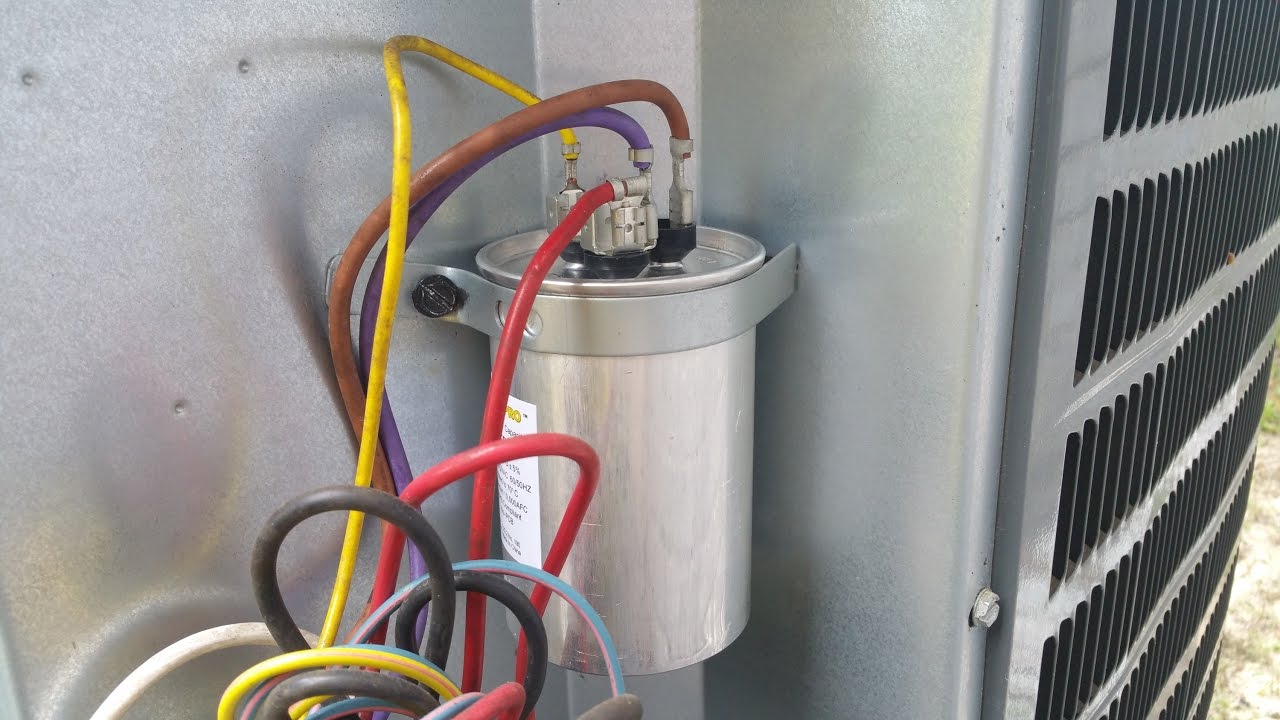How Much To Replace Capacitor In Ac Unit

Air conditioning units rely on a complex interplay of components to keep your home cool and comfortable. One seemingly small, but critically important part, is the capacitor. When a capacitor fails, your AC unit can malfunction or stop working entirely. Understanding the cost of capacitor replacement is crucial for homeowners facing this common AC repair.
What is an AC Capacitor and Why Does It Fail?
An AC capacitor is an electrical component that stores energy and releases it quickly to help start and run the motors in your AC unit. Think of it like a battery that gives a powerful, short burst of energy to get things moving.
Your AC unit typically has two types of capacitors:
- Start Capacitor: Provides the initial jolt of energy to start the compressor and fan motors. It's like the initial push you give a swing to get it going.
- Run Capacitor: Helps keep the motors running smoothly and efficiently once they're started. It's like the gentle pushes you give the swing to keep it going at a consistent pace.
Capacitors fail for several reasons, including:
- Age: Like any electrical component, capacitors have a limited lifespan. Over time, they degrade and lose their ability to store energy.
- Heat: High temperatures can accelerate the degradation process. AC units located in direct sunlight or poorly ventilated areas are more susceptible to capacitor failure.
- Voltage Fluctuations: Power surges or voltage dips can damage the internal components of a capacitor.
- Physical Damage: Vibrations or impacts can also cause a capacitor to fail.
Symptoms of a Failing AC Capacitor
Recognizing the symptoms of a failing capacitor can help you address the problem quickly and prevent further damage to your AC unit. Here are some common signs:
- AC Unit Not Starting: This is one of the most obvious signs. If the capacitor can't provide the necessary jolt, the compressor or fan motor won't start. You might hear a humming sound, but the unit won't kick on.
- Humming Noise: A failing capacitor might cause the motor to hum loudly without starting.
- AC Unit Starts Slowly: If the capacitor is weak, it might take longer than usual for the AC unit to start.
- AC Unit Cycles On and Off Frequently (Short Cycling): A failing capacitor can cause the compressor to overheat and shut down prematurely, leading to short cycling.
- Increased Energy Bills: A struggling capacitor can cause the AC unit to work harder, consuming more energy and increasing your electricity bill.
- Warm Air: If the compressor isn't running properly due to a bad capacitor, the AC unit won't cool the air effectively.
Factors Affecting the Cost of AC Capacitor Replacement
The cost of replacing an AC capacitor can vary depending on several factors:
- Type of Capacitor: Start capacitors are typically more expensive than run capacitors due to their higher voltage and current requirements.
- Size (Microfarads - µF): Capacitors are rated in microfarads (µF), which indicates their capacitance or ability to store energy. Larger capacitors are generally more expensive.
- Voltage Rating: Capacitors also have a voltage rating. Higher voltage ratings usually mean a higher price.
- Brand: Some brands are known for their quality and reliability and may command a premium price.
- Labor Costs: Labor costs will vary depending on the contractor's rates and the complexity of the job.
- Location: Prices can vary depending on your geographic location. Areas with higher costs of living tend to have higher labor rates.
- Accessibility of the Unit: If the AC unit is difficult to access, the labor costs may be higher.
- Emergency Service: If you need the capacitor replaced outside of normal business hours, you can expect to pay a premium for emergency service.
Typical Cost Range for AC Capacitor Replacement
Generally, the cost to replace an AC capacitor ranges from $100 to $400. This includes the cost of the capacitor itself and the labor to install it.
- Capacitor Cost: The capacitor itself typically costs between $20 and $100, depending on the factors mentioned above.
- Labor Cost: Labor costs can range from $80 to $300, depending on the contractor's rates and the complexity of the job. Some contractors charge a flat rate for capacitor replacement, while others charge by the hour.
Important Note: These are just estimates. It's always best to get quotes from multiple HVAC contractors to get a more accurate idea of the cost in your area.
DIY vs. Hiring a Professional
While it might be tempting to replace the capacitor yourself to save money, it's generally not recommended unless you have experience working with electrical components and a thorough understanding of AC systems.
Reasons to Hire a Professional:
- Safety: AC units contain high-voltage electricity, which can be dangerous. Working with electricity without proper training can result in serious injury or death.
- Correct Diagnosis: A failing capacitor can sometimes mimic other AC problems. A professional can accurately diagnose the problem and ensure that the capacitor is the actual cause.
- Proper Installation: Installing the wrong type of capacitor or connecting it incorrectly can damage the AC unit. A professional will ensure that the correct capacitor is installed properly.
- Warranty: Many HVAC contractors offer warranties on their work and the parts they install. If something goes wrong after the repair, you'll be covered.
- Refrigerant Handling: Although capacitor replacement *typically* doesn't involve refrigerant, a professional is certified to handle refrigerant if a leak or other issue arises during the repair. Think of refrigerant as the "blood" of your AC system, carrying heat from inside to outside. Improper handling can harm the environment and is illegal.
When DIY Might Be Okay:
- You are very skilled with electrical components and understand the safety implications.
- You can confidently identify the correct replacement capacitor.
- You have the necessary tools and equipment.
- You are comfortable working with potentially dangerous voltages.
If you decide to DIY, always disconnect the power to the AC unit at the breaker before starting any work. Discharge the capacitor before handling it to avoid electric shock.
Getting Quotes from HVAC Contractors
If you decide to hire a professional, it's important to get quotes from multiple HVAC contractors to ensure you're getting a fair price. Here are some tips for getting quotes:
- Get at least three quotes: This will give you a good idea of the average cost in your area.
- Ask for a detailed breakdown of the costs: The quote should include the cost of the capacitor, labor, and any other fees.
- Check the contractor's credentials: Make sure the contractor is licensed and insured.
- Read online reviews: See what other customers have to say about the contractor's work.
- Ask about warranties: Find out what kind of warranty the contractor offers on their work and the parts they install.
- Don't just choose the cheapest quote: Consider the contractor's experience, reputation, and warranty when making your decision. Sometimes, paying a little more for a reputable contractor is worth it in the long run.
Extending the Life of Your AC Capacitor
While capacitors will eventually fail, there are things you can do to extend their lifespan:
- Regular AC Maintenance: Schedule regular maintenance with a qualified HVAC technician. They can inspect the capacitor and other components of your AC unit and identify potential problems before they become major issues.
- Keep the AC Unit Clean: Clean the coils and fins of the AC unit regularly to ensure proper airflow. This will help prevent the unit from overheating, which can damage the capacitor.
- Protect the AC Unit from the Sun: If possible, shade the AC unit from direct sunlight. This will help keep it cooler and prevent the capacitor from overheating.
- Install a Surge Protector: A surge protector can help protect the AC unit from voltage fluctuations, which can damage the capacitor.
- Don't Overwork the AC Unit: Avoid setting the thermostat too low, as this can cause the AC unit to work harder and shorten the lifespan of the capacitor.
Conclusion
Replacing an AC capacitor is a common repair that can often be done relatively quickly and affordably. By understanding the factors that affect the cost and knowing the symptoms of a failing capacitor, you can make an informed decision about whether to hire a professional or attempt the repair yourself. Regular maintenance and proper care can also help extend the lifespan of your capacitor and prevent future problems. Remember to always prioritize safety when working with electrical components and consult with a qualified HVAC technician if you have any doubts.










